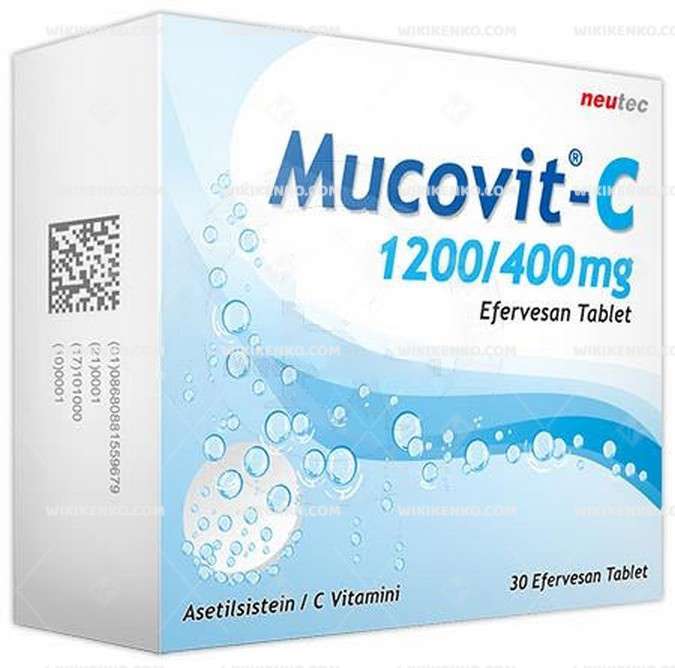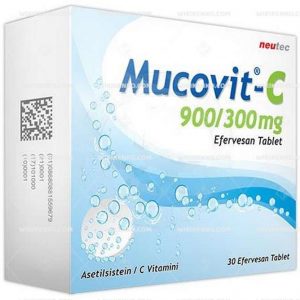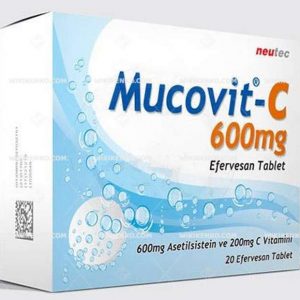Mucovit-C Efervesan Tablet 1200 Mg
Mucovit-C Efervesan is a mucolytic drug available in an effervescent tablet form that helps in the treatment of bronchial secretion disorders and bronchopulmonary diseases. This article provides an overview of Mucovit-C Efervesan’s active ingredients, uses, and potential side effects.
| Potency | 1200 Mg |
|---|---|
| Manufacturer | |
| Origin | |
| Generic Name (Ingredient) | Acetylcysteine 1200 Mg Ascorbic Acid 400 Mg |
Assuming your emergency circumstances for this product, visit Urgent Quotation page. Besides, for any pharmaceutical questions, please ask us in the comments section.
Description
Ingredients: Active and Inactive Components
Each Mucovit-C Efervesan tablet contains two active ingredients: acetylcysteine and ascorbic acid (vitamin C). Acetylcysteine is a mucolytic agent that helps in the treatment of bronchial secretion disorders by breaking down the thick mucus and reducing its density. Ascorbic acid, on the other hand, is an antioxidant that helps in the prevention of oxidative damage to the lungs.
Apart from these active components, Mucovit-C tablets also contain several inactive ingredients. These include PEG 6000, povidone K-30, sucralose (E 955), sodium chloride, monosodium citrate, sodium hydrogen carbonate, and lemon flavor.
Uses: Facilitating Mucus Removal and Expectoration
Mucovit-C is primarily used for the treatment of bronchopulmonary diseases where bronchial secretion disorders need to be treated. It helps in the facilitation of mucus removal by regulating its density and making it easier to expectorate. The drug’s mucolytic properties make it an effective treatment option for respiratory conditions like chronic bronchitis, bronchiectasis, and cystic fibrosis.
How to Use: Oral Administration
Mucovit-C tablets are designed for oral administration. The recommended dosage is usually one tablet per day, but your doctor or pharmacist may prescribe a different dosage based on your condition’s severity. It is essential to follow the prescribed dosage and consult a healthcare professional for more detailed information on how to use the medication.
Potential Side Effects: What You Need to Know
Like any medication, Mucovit-C may cause some side effects. Common side effects of the drug include nausea, headaches, hives, mouth inflammation, runny nose, chills, fever, and bronchospasm. These side effects are usually mild and go away on their own, but if they persist or worsen, you should consult your doctor or pharmacist.
In rare cases, more severe side effects like rashes, drowsiness, low blood pressure, and liver problems may occur. If you experience any of these symptoms while taking Mucovit-C, seek immediate medical attention.
Conclusion
Mucovit-C is an effective treatment option for bronchopulmonary diseases that cause bronchial secretion disorders. Its active ingredients, acetylcysteine, and ascorbic acid, work together to facilitate mucus removal and expectoration. While the drug is generally well-tolerated, it may cause some side effects that should be monitored and reported to a healthcare professional. If you are experiencing respiratory problems, consult your doctor or pharmacist to see if Mucovit-C Efervesan could be a suitable treatment option for you.
Use the form below to report an error
Please answer the questions as thoroughly and accurately as possible. Your answers will help us better understand what kind of mistakes happen, why and where they happen, and in the end the purpose is to build a better archive to guide researchers and professionals around the world.
The information on this page is not intended to be a substitute for professional medical advice, diagnosis, or treatment. always seek the advice for your physician or another qualified health provider with any questions you may have regarding a medical condition. Always remember to
- Ask your own doctor for medical advice.
- Names, brands, and dosage may differ between countries.
- When not feeling well, or experiencing side effects always contact your own doctor.
Cyberchondria
The truth is that when we’re sick, or worried about getting sick, the internet won’t help.
According to Wikipedia, cyberchondria is a mental disorder consisting in the desire to independently make a diagnosis based on the symptoms of diseases described on Internet sites.
Why you can't look for symptoms on the Internet
If diagnoses could be made simply from a textbook or an article on a website, we would all be doctors and treat ourselves. Nothing can replace the experience and knowledge of specially trained people. As in any field, in medicine there are unscrupulous specialists, differences of opinion, inaccurate diagnoses and incorrect test results.





Reviews
There are no reviews yet.